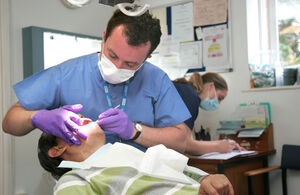More NHS dentistry for those who need it most
New reforms to the dental contract will prioritise those with urgent and complex needs, with new measures for those with extreme tooth decay and gum disease.

-
New reforms to the dental contract will prioritise those with urgent and complex needs, with new measures for those with extreme tooth decay and gum disease
-
Cements manifesto commitment to deliver 700,000 additional urgent dental appointments every year, and pledge to ramp up preventative care for children’s dental health
-
Newly qualified dentists to work in the NHS for a minimum period, intended to be 3 years, to boost appointments
Patients will find it easier to get an urgent care appointment under planned reforms to incentivise dentists to deliver more NHS work and fix the foundations of dentistry.
Satisfaction with NHS dentistry has fallen to a record low, with the British Dental Association outlining that over 1 in 4 adults are struggling to access NHS dental care.
The government is proposing a swathe of changes to tackle this, as it opens up a major consultation on NHS dentistry contract today (8 July 2025) to increase the amount of care.
For example, it is currently less cost effective for dentists to take on patients who need more complex and extensive treatments such as crowns, bridges and dentures. The government is proposing to overhaul failing approaches like these and incentivise dentists more.
A new, special course of treatment for patients with severe gum disease or with at least 5 teeth with tooth decay, more money for denture modifications, and a requirement for dentists to deliver a set amount of urgent and unscheduled care each year, are also part of the government’s plans for dental contract reform.
The government will also bring in robust preventative measures for children’s teeth, including better use of tooth resin sealants for children with a history of dental decay and applying fluoride varnish on children’s teeth without a full dental check-up.
This follows the latest stats showing that 22.4% of 5 year old schoolchildren in England had experience of obvious dental decay, with tooth decay the most common reason for hospital admissions in children aged between 5 and 9 years.
Measures to make dental staff feel rewarded, incentivised and a bigger part of the NHS are also part of the government’s proposed package.
Just last week, the government’s 10 Year Health Plan set out measures to improve dental access for all, including a requirement for newly qualified dentists to practise in the NHS for a minimum period, intended to be 3 years.
Health Minister Stephen Kinnock said:
We inherited a broken NHS dental system that is in crisis. We have already started fixing this, rolling out 700,000 urgent and emergency appointments and bringing in supervising toothbrushing for 3 to 5 year olds in the most deprived areas of the country.
But to get us to a place where patients feel NHS dentistry is reliable again, we have to tackle the problems in the system at their root.
These reforms will bring common sense into the system again, attracting more NHS dentists, treating those with the greatest need first and changing the system to make it work.
This is essential to our Plan for Change - building an NHS fit for the future and making sure poor oral health doesn’t hold people back from getting into work and staying healthy.
This consultation builds on action already taken to:
- roll out 700,000 additional appointments
- address the immediate needs of patients in pain
- introduce a national supervised toothbrushing programme for 3 to 5 year olds
- recruit more NHS dentists through a nationwide ‘Golden Hello’ scheme
The consultation will run for 6 weeks, closing on 19 August 2025.